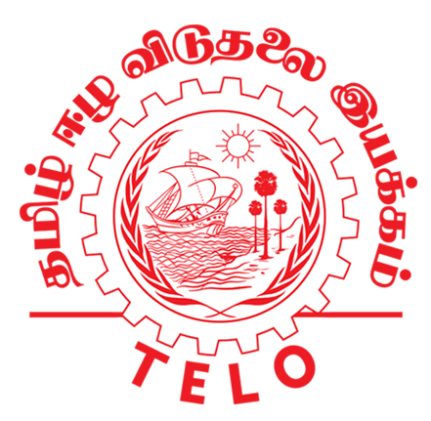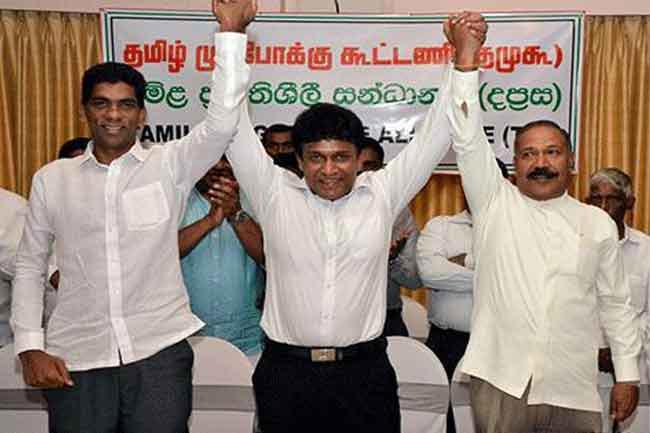Seeking to bury past differences, two main Tamil political parties have come together. Veteran leader Mano Ganesan has declared that the Tamil Progressive Alliance (TPA) under his leadership and the Ceylon Workers’ Congress (CWC), now headed by third-generation leader, Jeevan Thondaman, would work like a double-barrelled gun for the benefit and betterment of the community.
The occasion was provided by the inauguration of the TPA’s Headquarters, attended by both leaders and other community politicos like former minister, Palani Thigambaram, apart from SJB Leader of the Opposition, Sajith Premadasa, and Indian High Commissioner, Gopal Baglay.
Of course, one of the TPA’s allies, former minister V. Radhakrishnan has since expressed unhappiness over Mano making such ‘unilateral declarations’ without prior consultations in the matter. Yet, if Mano and Jeevan decide to work together, that is saying a lot – and sends out a message to other Tamil-speaking communities in the Sri Lankan Tamils (SLT) and Muslims.
If such reformist thinking comes across in the other two, then all three ‘minority’ communities can work together, providing for healthy politics also at the national-level. Of course, all of it takes time, yes, but remember, time and tide wait for none, and not certainly, eternally.
Low-profile attempt
To set the record straight, a low-profile attempt was made to unify the ever-divisive Upcountry polity in the post-war scenario, with academics and others close to respective party leaderships meeting a few times, to see how far and how best could their leaders work together, towards a common cause. The credit for initiating the process should go to former minister P.P. Devarajan, who stayed in the background for most parts.
There were no ideological differences, but only personality clashes. Hence, once the leaders were ready to subsume the latter, a unified approach could at least be attempted at that time. Or, that was the thinking. Yet, the intervening presidential polls of 2010, followed by parliamentary elections, put paid to those efforts. Revival of the attempts were not initiated.
Of course, there were approach-based differences, too. Under the late Arumugan Thondaman, the CWC, for instance, insisted on continuing with founder and grandfather Savumiamoorthy Thondaman’s ‘non-confrontationist approach’ viz the government of the day. They felt that Mano Ganesan & Co was ‘too demonstrative and confrontationist’ for their comfort.
Mano Ganesan did not have any such reservations, it would seem. Today, he is the senior-most of Upcountry Tamil leaders with a substantial base. When approached, Jeevan Thondaman, son of Arumugan, did not seem to have stood on ‘family pride’ and personal ego like the previous generations, to stall the much-needed unity efforts in the polity of his community, also known as ‘Indian Origin Tamils’ (IOT).
As coincidence would have it, between Mano Ganesan’s 62 years and Thigambaram’s 55, Jeevan at 28 is well poised to possibly take over the leadership of a united/unified community polity in his time. Anyway, he too needs greater exposure and experience as his cousin and party leader Senthil Thondaman, a former Uva Province Minister, guides him through the difficult days.
Delayed mainstreaming
What settled the issue for the Upcountry Tamil parties, for them to think in terms of working together? The continuing economic crisis has hit the community harder than any section of the Sri Lankan society. It was always hard on the Upcountry Tamils even in the best of times, as their joining the national mainstream was delayed by decades after their disenfranchisement and statelessness imposed by the rest of the nation, post-Independence.
The irony was that the vociferous and self-serving Sri Lankan Tamil (SLT) polity of the time joined hands with the Sinhala-centric ruling UNP to divest the Estate Tamils of their citizenship. So forced out of the mainstream have they been that even in neighbouring India, their country of origin, starting with native Tamil Nadu, the IOTs did not get the same attention and care as the SLT community and polity got after Pogrom-‘83.
Yet, a unified approach among IOT parties is not going to be as easy as being made out. By inviting SJB’s Premadasa to the function, Mano has sort of shown his unwillingness to move away from the mainline Opposition, towards a more moderate middle path. Ideologically, the CWC may feel more comfortable there. Yet, in these trying times, their people want ‘change’ – but they need relief, even more.
Plantation economy
Accepting medicines from India, handed over by CWC’s Jeevan Thondaman at a separate function, President Ranil Wickremesinghe said the Government would appoint a ‘committee to further integrate Tamils of Hill Country Origin’ into the Sri Lankan society – a sad, if not sadistic acknowledgement of the community’s plight decades after Independence.
The President said steps will now be taken to review the plantation economy as more and more people are leaving the region and also the sector after getting educated. The Government has to find jobs for them as well as for other Sinhalese and Muslims who leave their areas to settle elsewhere, he added. That would still be a beginning, but a good beginning, delayed already.
Specifically, the President offered to look into the social sector needs of these people, and promised special attention to the schools there, adding that the Health Ministry would take over the hospitals for those people, to ensure better quality and services. The Government was also granting lands to the plantation people for them to build their own houses, like the rest of the Sri Lankan society.
This is a new thinking, possibly influenced by a group of Upcountry Tamil elite and intellectuals who have seen through the possibilities and the worst-case scenarios. Yet, the fact that President Wickremesinghe had to say that much needed to be done for the estate people is a clear indication that they have not been integrated and mainstreamed as much as they should have been.
It also underscores the need for the divided polity to work together and work as a pressure group, to ensure that the incumbent President’s promises do not remain only as promises. This applies to his successors, too, for years and decades – but it should not be allowed to hit a half-century or wait for a century!
About the writer:
The writer is a policy analyst & political commentator, based in Chennai, India. Email: sathiyam54@nsathiyamoorthy.com
(The views and opinions expressed in this column are writer’s own and do not necessarily reflect the official policy or
position of Ceylon Today)
By N. Sathiya Moorthy





